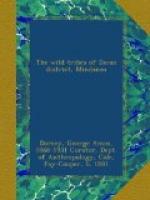[Transcriber’s note: matalo in the paragraph above means “coward.”]
The magani is one of the leaders in a war party; he is chosen to inflict the death penalty when it is decreed, and it is men of this class that assist in the human sacrifices. He is under the special protection of Mandarangan and Darago, and all petitions to these powerful spirits must be made through him. His clothing is considered the property of these spirits, and when such specimens were secured for the collection, the wearer would invariably place the garment beside some prized article, such as a knife or spear, then taking a green betel nut would rub the garment and object, meanwhile beseeching the spirits to leave the one and enter the other. Later the nut was placed in the tambara belonging to those spirits. A father may not bequeath to his son the right to the red clothing; and such articles, together with his weapons, should be buried with him. Should one not entitled to these garments dare to make use of them, the spirits would straightway cause his body to swell or turn yellow, and he would die.
In a previous paragraph we mentioned the unorganized priesthood, the members of which are known as mabalian. Men are not barred from this profession, but the greater number of its members are old, or middle-aged, women.[1] A woman may live the greater part of her life without an idea of becoming a member of this order, and then suddenly be warned in dreams, by visions, or by other mabalian that she has been chosen by the spirits. The one thus elected becomes a pupil of a qualified mabalian and for several months will be drilled in the duties of that office. She will be taught the medicines to be used at certain times,[2] the duties of a midwife, the correct method of building shrines and conducting ceremonies, and finally, she will learn the prayers with which the spirits should be addressed. It seems to be the belief that, at times during the ceremonies, the mabalian may be possessed by a spirit and that she then speaks not as a mortal but as the spirit itself. She also knows how to weave and dye the turban worn by the magani, and because of this accomplishment is considered to be under the protection of Baitpandi,[3] and is permitted to wear garments made of red cloth, the same as the magani.
[1] There are five mabalian in Cibolan, all of whom are women past middle life.
[2] A medicine is used with the idea that it assists in driving away evil influences.
[3] The patron spirit of the weavers.
The workers in the various crafts are under the guidance and protection of special spirits, but there is no bar against other members of the tribe entering those professions.
Apparently then, Bagobo society is divided into several classes or divisions, but with the exception of a few individuals in the slave class, there is a possibility or an opportunity for each member of the tribe to enter any class open to his or her sex. Even a slave woman may become the wife of a datu, and her son may assume the leadership of the tribe.




